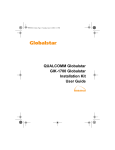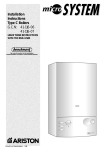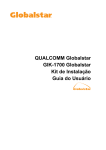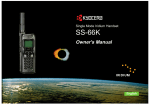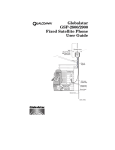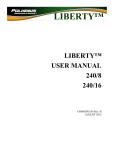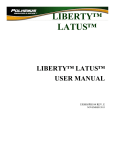Download Qualcomm Globalstar GCK-1410 User guide
Transcript
QUALCOMM Globalstar GCK-1400 Hands-Free Car Kit Installation/User Guide This guide is based on the production version of the QUALCOMM Globalstar GCK-1400 Hands-Free Car Kit. Software changes may have occurred after this printing. QUALCOMM reserves the right to make changes in technical and product specifications without prior notice. QUALCOMM Incorporated 5775 Morehouse Drive, San Diego, CA 92121-1714 Document Number 80-98438-1EN Rev. A Model Number CXCKT051-1 Copyright 1999 QUALCOMM® Incorporated. All rights reserved. This technology was exported from the United States in accordance with the Export Administration Regulations. Diversion contrary to U.S. law prohibited. QUALCOMM® is a registered trademark of QUALCOMM Incorporated. Digital by QUALCOMM® is a registered trademark of QUALCOMM Incorporated. SMART KEY™ is a trademark of QUALCOMM Incorporated. Globalstar™ is a trademark of Loral Qualcomm Satellite Services, Inc. Printed in the United States of America Contents Introduction ...............................................................................................1 Features .................................................................................................1 Safety precautions .................................................................................1 Exposure to radio frequency signals .....................................................1 Antenna care ..........................................................................................2 Phone operation .....................................................................................2 Driving ...................................................................................................2 Electronic devices ..................................................................................3 Pacemakers .....................................................................................3 Hearing aids ...................................................................................3 Other medical devices ....................................................................3 Vehicles ...........................................................................................3 Posted facilities ...............................................................................3 Blasting areas ........................................................................................4 Potentially explosive atmospheres .......................................................4 For vehicles equipped with an air bag ..................................................4 Operation ....................................................................................................5 Using the phone in a vehicle .................................................................5 Attaching the phone to the Hands-Free Car Kit cradle ...............5 Turning on the phone and Hands-Free Car Kit ...........................5 Car stereo mute ..............................................................................6 Hands-free mode ....................................................................................7 When you use hands-free mode .....................................................7 Adjusting speaker volume .....................................................................7 Connecting to a personal computer or fax (optional) ...........................7 Privacy Handset (optional) ....................................................................8 Privacy handset operation .............................................................8 Privacy Headset .....................................................................................9 Privacy headset operation ..............................................................9 Installation ................................................................................................11 Unpacking the Hands-Free Car Kit ...................................................11 Hands-Free Car Kit standard components .................................11 Hands-Free Car Kit optional accessories ....................................12 Component parts .................................................................................13 Globalstar electronic module .......................................................13 Hands-Free Car Kit cradle ...........................................................13 Hands-Free speaker .....................................................................13 Hands-Free microphone ...............................................................13 Car interface cable ........................................................................13 Car stereo muting (STEREO MUTE) ..........................................14 Ignition sense ................................................................................14 Outdoor unit .................................................................................14 Optional accessories ............................................................................14 ODU cable .....................................................................................14 Privacy handset ............................................................................14 Privacy headset and adapter .......................................................15 Cellular antenna (not included) ...................................................16 iii Data cable (not included) .............................................................16 Precautions for installation .................................................................16 Where to install ...................................................................................16 Suggested positioning of components ..........................................17 Hands-Free Car Kit ......................................................................18 Installing the Hands-Free microphone ..............................................18 To install on the door post trim ...................................................18 To install on the sun visor ............................................................18 Installing the Hands-Free speaker .....................................................19 Connecting the leads on the car interface cable ................................20 Connection diagram .....................................................................20 Making the following connections ...............................................20 Notes on cable routing ..................................................................21 Mounting the ODU ..............................................................................22 Testing the car kit installation ...........................................................23 Errata .........................................................................................................24 Bulleted References .............................................................................24 MPE Distance Restriction Statement ................................................24 ODU Caution .......................................................................................24 iv Before installing your Hands-Free Car Kit in a vehicle, please read this manual thoroughly and retain it for future reference. Professional installation is recommended. Features The Hands-Free Car Kit allows your Globalstar portable phone to be used as a mobile telephone in your vehicle. With this car kit installed in a vehicle, you can: ■ ■ ■ ■ Turn the phone on and off by turning the vehicle’s ignition on and off. Talk without picking up the phone. Obtain unlimited talk time using DC current supplied by your vehicle. Charge the phone’s battery. Safety precautions When using your phone in a vehicle, please observe the following rules. Caution Failure to follow these instructions may lead to serious personal injury and possible property damage. ■ ■ ■ Secure the phone in your vehicle to prevent personal injury and damage to the phone in the event of an accident. When attaching or detaching the Outdoor Unit (ODU/GCK-9) to the car kit with the ODU cables, disconnect all power to the phone and car kit. Note that DC voltage is present in the central conductor of the ODU cable (GCK-10, GCK-11). See Hands-Free Car Kit standard components, page 11. Detach the phone from the Hands-Free Car Kit and disconnect power (GCK-7) to the Globalstar electronic module (GEM/GCK-1) when jump starting the vehicle or recharging the car battery. Jump starting may cause the car kit fuse to open. See Hands-Free Car Kit standard components, page 11. Exposure to radio frequency signals Your wireless handheld portable telephone is a low power radio transmitter and receiver. When it is ON, it receives and also sends out radio frequency (RF) signals. In August, 1996, the Federal Communications Commissions (FCC) adopted RF exposure guidelines with safety levels for hand-held 1 Introduction Introduction wireless phones. Those guidelines are consistent with the safety standards previously set by both U.S. and international standards bodies: ANSI C95.1 (1992)1 NCRP Report 86 (1986)2 ■ ICNIRP (1996)3 Those standards were based on comprehensive and periodic evaluations of the relevant scientific literature. For example, over 120 scientists, engineers, and physicians from universities, government health agencies, and industry reviewed the available body of research to develop the ANSI Standard (C95.1). ■ ■ The design of your phone and this car kit comply with the FCC guidelines (and those standards). Antenna care Use only the supplied or an approved replacement antenna. Unauthorized antennas, modifications, or attachments could damage the phone and may violate FCC regulations. Phone operation Normal POSITION: Hold the phone as you would any other telephone with the antenna pointed up and over your shoulder. TIPS ON EFFICIENT OPERATION: For your phone to operate most efficiently: ■ ■ Extend your antenna fully. Do not touch the antenna unnecessarily when the phone is in use. Contact with the antenna affects call quality and may cause the phone to operate at a higher power level than otherwise needed. Driving Check the laws and regulations on the use of wireless telephones in the areas where you drive. Always obey them. Also, if using your phone while driving, please: ■ ■ ■ Give full attention to driving – driving safely is your first responsibility; Use hands-free operation, if available; Pull off the road and park before making or answering a call if driving conditions require you to do so. 1.American National Standards Institute 2.National Council on Radiation Protection and Measurements 3.International Commission on Non-Ionizing Radiation Protection 2 Introduction Electronic devices Most modern electronic equipment is shielded from RF signals. However, certain electronic equipment may not be shielded against the RF signals from your wireless phone. Pacemakers The Health Industry Manufacturers Association recommends that a minimum separation of six (6”) inches be maintained between a handheld wireless phone and a pacemaker to avoid potential interference with the pacemaker. These recommendations are consistent with the independent research by and recommendations of Wireless Technology Research. Persons with pacemakers: ■ ■ ■ ■ Should ALWAYS keep the phone more than six inches from their pacemaker when the phone is turned ON; Should not carry the phone in a breast pocket; Should use the ear opposite the pacemaker to minimize the potential for interference. If you have any reason to suspect that interference is taking place, turn your phone OFF immediately. Hearing aids Some digital wireless phones may interfere with some hearing aids. In the event of such interference, you may want to consult your service provider (or call the customer service line to discuss alternatives). Optional for each phone manufacturer. Other medical devices If you use any other personal medical device, consult the manufacturer of your device to determine if it is adequately shielded from external RF energy. Your physician may be able to assist you in obtaining this information. Turn your phone OFF in health care facilities when any regulations posted in these areas instruct you to do so. Hospitals or health care facilities may be using equipment that could be sensitive to external RF energy. Vehicles RF signals may affect improperly installed or inadequately shielded electronic systems in motor vehicles. Check with the manufacturer or its representative regarding your vehicle. You should also consult the manufacturer of any equipment that has been added to your vehicle. Posted facilities Turn your phone OFF in any facility where posted notices require you to do so. 3 Blasting areas To avoid interfering with blasting operations, turn your phone OFF when in a “blasting area” or in areas posted: “Turn off two-way radio”. Obey all signs and instructions. Potentially explosive atmospheres Turn your phone OFF when in any area with a potentially explosive atmosphere and obey all signs and instructions. Sparks in such areas could cause an explosion or fire resulting in bodily injury or even death. Areas with a potentially explosive atmosphere are often but not always clearly marked. They include fueling areas such as gasoline stations; below deck on boats; fuel or chemical transfer or storage facilities; vehicles using liquefied petroleum gas (such as propane or butane); areas where the air contains chemicals or particles, such as grain, dust, or metal powders; and any other area where you would normally be advised to turn off your vehicle engine. For vehicles equipped with an air bag An air bag inflates with great force. DO NOT place objects, including both installed or portable wireless equipment, in the area over the air bag or in the air bag deployment area. If in-vehicle wireless equipment is improperly installed and the air bag inflates, serious injury could result. 4 Operation Using the phone in a vehicle Attaching the phone to the Hands-Free Car Kit cradle 1. 2. Clr d En f3 de c2 no6 Info m kl 5 v8 tu yz9 Clr wx # 0 r pw e as e l Re ton t Bu abc jkl 2 d En def 3 6 mno 5 z9 wxy uv8 # 0 r pw 526AA_1999Q Caution Avoid pulling the phone out of the cradle without first depressing the release button. If you do so, you could damage the phone and the cradle. Turning on the phone and Hands-Free Car Kit When you turn on the vehicle’s ignition, the phone and the car kit are turned on. The phone is ready to make or receive a call. 5 Operation 3. Firmly insert the phone into the bottom of the cradle. Push down on the phone until it locks into place. You should hear a click. To remove the phone, press the release button on the side of the cradle, and gently remove the phone. Accessory position ACC OFF START LOCK 358AB_1999Q Note If you turn off the vehicle’s ignition during a call, the car kit remains on so you can continue talking. The car kit turns off 30 seconds after you terminate the call. Car stereo mute Note This feature requires a car stereo that supports it. The car kit has the ability to mute the car stereo system automatically when you make or receive a call if the car stereo has an audio mute line (STEREO MUTE). For more information see Making the following connections, page 20. 6 Hands-free mode The car kit allows you to use your phone more efficiently and safely while driving in your vehicle. When the phone is properly attached to the car kit and the vehicle’s ignition is on, you can speak into the microphone and listen to the other party through the speaker while keeping both hands on the steering wheel. Note Operation Do not extend the phone’s built-in Globalstar or cellular antenna while the phone is connected to the car kit. Caution You should stop the vehicle in a safe place before attempting to dial a number. If you must talk while the vehicle is moving, use the Hands-Free microphone so that you can always concentrate on traffic conditions. When you use hands-free mode ■ ■ It is recommended that you use one-touch dialing or speed dialing to simplify key operations. See User Guide, QUALCOMM Globalstar GSP-1610 Single-Mode User Terminal or QUALCOMM Globalstar GSP-1600 Tri-Mode Phone. Exercise extreme caution with traffic conditions. Adjusting speaker volume You can use the volume keys on the side of the phone to adjust the HandsFree speaker volume. You can: ■ ■ Adjust the phone speaker volume while on a call. Adjust the ringer volume when the phone is not on a call. Note You can also use menus to adjust the volume. Refer to the phone user guide. Connecting to a personal computer or fax (optional) Note You cannot hook up an analog fax machine to the car kit to receive faxes. Check with your satellite service provider for further information on connecting to a personal computer. Connecting a serial port cable (RS-232, 9 pin) from your PC to the data port of the car kit GEM (GCK-1) allows the phone to send and receive data via the car kit. See Component parts, page 13. Use your PC fax software and the cable provided with your PC. 7 Note You cannot use the phone to talk while sending and receiving data. Privacy Handset (optional) 551AA_1999Q Privacy handset operation If background noise makes it difficult for either party to converse in handsfree mode, use the optional privacy handset or privacy headset. To switch from hands-free operation to handset operation and make a call: Lift the handset either before or after you dial the desired number. Dial the number on the keypad of your phone. ■ Press Send . To receive a call with the handset: ■ ■ Lift the handset. When you lift the handset from its cradle, the Hands-Free speaker and microphone are muted, and you can speak in privacy. ■ To end a call with the handset: Press End and replace the handset. To switch from the handset to hands-free mode while on a call: ■ ■ 8 Replace the handset. When you replace the privacy handset in its cradle, the Hands-Free speaker and microphone are no longer muted. Privacy Headset Privacy headset operation Note Setting up the headset ■ ■ ■ ■ Before starting to drive, plug the headset into the adapter attached to the car kit cradle. Place the earplug into either ear. The earplug should be firmly in place, but not jammed into the ear canal. Speak in the direction of the headset microphone instead of the HandsFree microphone. You will hear the other party through the earplug. Use the volume keys or Preferences menu on your phone to adjust the volume of the earplug when you are on a call. See the phone user guide. Using the headset To make a call with the headset: Dial the desired number on the keypad of your phone. Press Send . When you use the headset, the Hands-Free speaker and microphone are muted, and you can speak in privacy. ■ ■ To receive a call with the headset: When the phone rings, press any key except End or Pwr . See the phone user guide for information on the AnyKeyAnswer option. To end a call with the headset: ■ Press End . To switch from the headset to hands-free mode: ■ ■ Unplug the headset from the adapter when you are not driving. 9 Operation The optional privacy headset cannot be used at the same time as the privacy handset, and the headset will only work with the optional headset adapter. See your service provider for this and other optional accessories. 10 Installation Unpacking the Hands-Free Car Kit Unpack your Hands-Free Car Kit and check the contents listed on the next page. If there is something missing, please contact the service provider where you purchased your car kit. Hands-Free Car Kit standard components GCK - 2 GCK - 6 GCK - 3 GCK - 1 Installation GCK - 7 GCK - 14 GCK - 12 GCK - 13 Cellular antenna (not included) GCK - 10 Speaker Microphone Privacy Headset/ Handset Modem (not included) Cradle GCK - 11 Power GCK - 9 Black lead Green lead Red lead Yellow lead Ground STEREO MUTE Battery terminal (+) ACC (or ON) position 549AA_1999Q Legend: GCK = Globalstar Car Kit 561AA_1999Q 11 Hands-Free Car Kit optional accessories GCK - 4 (Optional) PC cable (not included) GCK - 8 (Optional) GCK - 5 (Optional) GCK - 1 028AB_1999q Legend: GCK = Globalstar Car Kit PC = Personal computer GCK-1 Globalstar electronic module (GEM) GCK-2 Hands-Free Car Kit cradle GCK-3 Hands-Free speaker GCK-4 Privacy headset (optional) GCK-5 Privacy headset adapter (optional) GCK-6 Hands-Free microphone GCK-7 Car interface cable GCK-8 Privacy handset (optional) GCK-9 Outdoor unit (ODU) 12 GCK-10 GCK-11 ODU cables GCK-12 Cradle pigtail to ODU GCK-13 Cradle pigtail to cellular antenna GCK-14 Cradle connector to GEM Cellular antenna (not included) Component parts Globalstar electronic module The Globalstar electronic module (GEM/GCK-1) interfaces to the vehicle’s power and houses the electronic circuit for the car kit. It provides and controls the supply voltages for the accessories and the charge current for the phone. Note Installation Do not install the GEM inside the engine compartment of the vehicle. Hands-Free Car Kit cradle The Hands-Free Car Kit cradle (GCK-2) securely holds the Globalstar portable phone. Hands-Free speaker The Hands-Free speaker (GCK-3) connects to the GEM (GCK-1) speaker jack. It should be mounted at least 20 inches (50 cm) away from the HandsFree microphone and should not be pointed towards the microphone. Hands-Free microphone The Hands-Free microphone (GCK-6), a unidirectional mouse-style microphone, connects to the GEM (GCK-1) microphone jack. It can be installed on the A-pillar with velcro or tape or on the driver’s sun visor using double-sided tape. Car interface cable The car interface cable (GCK-7) connects to the GEM (GCK-1) via the 4-pin connector. ■ ■ ■ ■ The fused red lead connects to the positive terminal of the vehicle’s battery. The black lead ground (GND) connects to a clean, unpainted metallic part of the vehicle. The fused green lead (STEREO MUTE) is for car stereo mute. The fused yellow lead (IGNS) is for ignition sense. 13 Car stereo muting (STEREO MUTE) The phone provides a feature to mute the car stereo automatically during a conversation which is convenient and provides for safer hands-free operation. When the phone rings, the green fused lead provided for the stereo mute feature goes to ground. Note This feature requires a car stereo that supports it. Ignition sense The ignition sense feature prevents the car kit from draining the vehicle’s battery by executing an auto power off 30 seconds after the ignition key has been turned off, if not currently in a call. The yellow wire of the car interface cable (GCK-7) is used for the ignition sense feature. The use of ignition sense is recommended to prevent accidental draining of the vehicle’s battery. The wire is connected via a fuse to the vehicle’s ignition. Do not connect it directly to the high voltage sections of the ignition circuit. Outdoor unit The Globalstar outdoor unit (ODU/GCK-9) permits communication with the satellite when the phone is installed in the cradle. ODU cables The ODU cables consist of a pair of coaxial cables (GCK-10, GCK-11) that connect the ODU to the cradle. Use only the ODU cables that come with your car kit when connecting the ODU. Do not cut or modify the ODU cables. Caution Note that DC voltage exists in the central conductor of the ODU cable. Be sure that the cable connector is installed inside the vehicle. Optional accessories ODU cable If a longer transition cable is needed, an optional longer cable is available. Contact your service provider for more information. Use only the ODU cables that come with your car kit when connecting the ODU. Do not cut or modify the ODU cables. Privacy handset The privacy handset (GCK-8) offers more privacy during a call than the hands-free mode and can be attached to the cradle (GCK-2) with a mounting plate. It is connected to the GEM (GCK-1) via a 6-position RJ-45 connector. 14 Mounting the privacy handset Installation 694AA_1999Q Privacy headset and adapter The privacy headset (GCK-4) offers more privacy during a call and is connected to the GEM through a headset adapter. The headset adapter (GCK-5) attaches to the cradle (GCK-2) with velcro and is plugged into the GEM (GCK-1). Note The optional privacy headset cannot be used at the same time as the privacy handset, and it will only work with the optional headset adapter. See your service provider for this and the other optional accessories. 15 Cellular antenna (not included) The cellular antenna is attached with a mini-UHF type connector to a pigtail (GCK-13) on the cradle and is used to enhance reception when the phone is in the cellular mode. This is not included with the car kit. Data cable (not included) A serial port data cable, RS-232, 9-pin, can connect a PC to the GEM (GCK1) so that the phone can send and receive data. This cable is not included in the car kit. See Hands-Free Car Kit optional accessories, page 12. Precautions for installation ■ ■ ■ ■ ■ ■ ■ ■ ■ ■ It is recommended that the car kit be installed by a professional car kit installer. Choose the mounting location of the GEM and cradle carefully so that they will not interfere with normal driving operations and are not exposed to hot air from the vehicle’s heater. The car kit should not be installed directly over any type of electrical or connecting wire or pipeline for fuel, oil, air conditioning, or other pipeline. Do not place objects, including both installed or portable wireless equipment, in the area over the air bag or in the air bag deployment area. If in-vehicle wireless equipment is improperly installed and the air bag inflates, serious injury could result. The car kit is designed for vehicles with a negative ground 12 volt electrical system only. If your vehicle has a negative ground 24 volt electrical system, use a suitable voltage regulator. Other supply voltages or polarities could damage the equipment. Use only the cables included in the car kit or the optional longer cable to connect the ODU to the cradle. Turn off the ignition and disconnect the vehicle’s battery terminal while installing the car kit. After installation, check that the car interface cable and external antenna cable do not interfere with opening and closing the doors and trunk, or with moving the sun visor, steering wheel, brakes, gear shift, or seats. Also, make sure all of the cables operate properly. After installation, make sure that all the components are secured and do not shift when the vehicle is in motion or comes to a stop. Use the supplied fuses for wiring. Where to install Note The installation of the car kit components may vary according to the make and model of your vehicle. Suggested positioning of the components is shown on the next page. 16 GEM ODU cable Installation Cellular antenna cable (not supplied) External cellular antenna (not supplied) ODU Phone and cradle To power Hands-Free speaker Hands-Free microphone Suggested positioning of components 17 Hands-Free Car Kit Hands-Free microphone Phone and cradle Info Clr End Send 1 abc 2 ghi4 jkl5 prs7 tuv8 * +0 def 3 mno6 wxyz9 # pwr 297AB_98 For connection information, see Making the following connections, page 20. Installing the Hands-Free microphone Note For best performance, locate the Hands-Free microphone approximately 20 inches (50 cm) or more from the Hands-Free speaker. Have a trained professional install the microphone on the door post trim or the driver’s side sun visor at a talking distance of approximately 16 inches (40 cm). A shorter distance may enhance performance under noisy conditions. To install on the door post trim 1. 2. Attach the microphone to the door post trim with velcro or double-sided tape. Aim the front of the microphone towards the driver. To install on the sun visor 1. 2. 18 Attach the microphone under the sun visor with double-sided tape. Aim the front of the microphone towards the driver’s face. Adhere to Visor S012_43A Note Route the microphone cable and secure it with commercially available tape so that it will not interfere with driving. Installing the Hands-Free speaker For best performance, install the speaker at least 20 inches (50 cm) from the microphone and do not point it towards the microphone. Remove the two screws to detach the speaker from the bracket. Secure the bracket to an appropriate flat surface in the vehicle using the two self-tapping screws (supplied), and then remount the speaker onto the bracket. 550AA_1999Q 19 Installation 1. 2. Connecting the leads on the car interface cable ■ ■ ■ ■ ■ Turn off the ignition and disconnect the vehicle battery terminal before connecting the leads. Make sure you do not drill through anything under the car. Connect the red and then the yellow power input leads only after all other leads have been connected. Make firm connections. Make sure the cables will not interfere with or be damaged by moving seats, pedals, or emergency brakes. Connection diagram Speaker Microphone Privacy Headset/ Handset Modem (not included) Cradle Power 2. 1. Black lead Green lead Red lead Yellow lead Ground STEREO MUTE Battery terminal (+) ACC (or ON) position 549AA_1999Q Making the following connections Use the connection diagram to connect the cables to the GEM in the order listed. 1. Before connecting the car interface cable to the GEM, connect the leads. Caution Do not connect the car interface cable to the GEM first. Follow the sequence listed below. 20 2. 3. 4. 5. 6. 7. 8. Whether the vehicle ignition has an ACC position or not, connect: ❑ Black lead ground (GND) to a clean unpainted metallic part of the vehicle. ❑ Green lead (STEREO MUTE) to the audio system, if applicable. ❑ Red lead to the positive terminal of the vehicle battery. ❑ If the vehicle ignition has an ACC position, connect the yellow lead to the Power Sense ACC position. ❑ If the vehicle ignition does not have an ACC position, connect the yellow lead to the ON position of the ignition (Power Sense). Connect the microphone and speaker to the GEM. Connect the ODU cables to the outdoor unit and to the cradle. Connect the cellular antenna (not included). Connect the cradle cable to the GEM. Connect the data cable (not included) to the GEM. Connect the optional privacy handset or privacy headset to the GEM. Connect the car interface cable to the GEM. Caution ■ ■ Maximum input voltage is 16.0 volts. Maximum input current is 4000 mA. Notes on cable routing ■ ■ ■ ■ ■ ■ If possible, use existing slots and channels in the vehicle for connection. Route the cables so that they will not tangle or interfere with the movement of seats, pedals, and emergency brakes. Avoid routing cables under floor mats in foot traffic areas so they will not catch on your feet. Route the cables so that they will not cause electrical interference. Be sure to cut the car interface cable to the necessary length, and then install the fuse holders where they are easily accessible. See Connection diagram, page 20. Be sure that the connector between GCK-10 and GCK-11 is inside the vehicle. See figure below. 21 Installation Exceeding the following input voltage and current values causes the power fuse to open, and it will have to be replaced. GCK - 9 GCK - 11 Info Clr End Send 1 abc 2 ghi4 jkl5 prs7 tuv8 * +0 def 3 mno6 wxyz9 # pwr GCK - 12 Carpet GCK - 10 354AB_1999Q Mounting the ODU The ODU is required for satellite communication when the phone is used inside a vehicle. It should be mounted on the roof of the vehicle with an unobstructed view of the sky. You can attach it to the roof of the vehicle using magnets or a ski rack type mount, or permanently bolt it in place. Note Check with your service provider for available ODU mounting options. If you mount the ODU using magnets, check the surface of the magnets before you put the ODU on the car. The ODU is not designed for high speed driving, so use moderate speeds if it is mounted on the roof. The metal surfaces on the underside of the ODU can get hot. Use caution when you take it off the roof. Be sure to route the ODU cable through the weather strip without pinching it. Use only the ODU cables that come with the car kit when connecting the ODU and do not cut or modify the ODU cable. Caution It is not recommended that you mount the ODU on the trunk or a lower surface. Performance could be affected by the shadow effect of the car. 22 Testing the car kit installation Once installed, the car kit should be tested to ensure that it is operating satisfactorily and that the position of the unit does not impair the driver’s ability to control and operate the vehicle in any way. Start the car, and listen for alternator whine. Check brake lights, headlights, air conditioning, and windshield wipers to see that they operate properly with the car kit installed. Use the phone to make a call when the vehicle is parked and the engine is running. During the call, switch off the engine. Ensure that the phone operates with the engine running and with the engine turned off. For information about using your phone, refer to the phone user guide. Installation 23 Errata The following text (bulleted references and MPE Distance Restriction Statement) replaces the current content under Introduction in the “Exposure to radio frequency signals” section. Bulleted References 1. 2. ■ 3. 4. ■ 5. Delete “ANSI C95.1 (1992)” from the bulleted list. Replace it with: ANSI/IEEE C95.1-1992 Standard Leave “American National Standards Institute” in the footnote at the bottom of the page. Add the following to the bulleted list: IRPA (1991) Guidelines on Protection Against Non-ionizing Radiation Add “Internal Radiation Protection Association” to the footnote at the bottom of the page. MPE Distance Restriction Statement Replace the paragraph under the bulleted list with the following: The phone and this car kit are designed to comply with established ANSI, FCC, and international safety standards for safe levels of human exposure to RF energy. Nonetheless, RF field intensity at the surface of the transmitting car kit antenna is fairly high. Maintaining a minimum line-of -sight separation distance of 35 cm (14 inches) between the transmitting antenna and all personnel will ensure that the General Population/ Uncontrolled Exposure Maximum Permissible Exposure (MPE) limits are not exceeded. This satisfies the MPE limits mandated by the FCC in 47 CFR Ch. 1 (10-1-98 Edition), Part 1, paragraph 1.1310 and defined in the ANSI/IEEE C95.1-1992 standard, and also satisfies the slightly more-stringent European and international exposure limit recommendations of IRPA (1991) and ICNIRP (1996). ODU Caution Add the following caution to the “Mounting the ODU” section: Caution As discussed in the earlier section on exposure to radio frequency signals, when the ODU is transmitting, it is necessary that at least 35 cm (14 inches) line-of-sight separation distance be maintained between the ODU antenna and the people within or near the vehicle. Mounting the ODU at least 35 cm from the edge of the vehicle roof will satisfy that requirement under normal use conditions. 24 A adjusting headset earplug volume phone menu 9 phone volume keys 9 adjusting phone speaker volume phone menus 7 phone volume keys 7 adjusting ringer volume phone volume keys 7 adjusting speaker volume phone volume keys 7 air bag safety 4 antenna cellular 7 Globalstar 7 antenna safety 2 C cables car interface cable 13 ODU 13, 14, 16 order to connect to GEM 20 routing 21 car interface cable 12 battery connection 13 ground 13 ignition sense 14 ignition sense feature 14 order to connect leads 20 stereo mute 13 car stereo mute 6, 14 cellular antenna 16 cradle 5, 12, 13 attaching the phone 5 privacy headset adapter 15 release button 5 cradle pigtail to cellular antenna 13 to GEM 13 to ODU 13 D data cable 16 data port GEM 7 dialing one touch 7 speed 7 driving safety 2 E electronic devices 3 F fax connecting to 7 G Globalstar Electronic (GEM) 12, 13 connection diagram 20 Module H Hands-Free Car Kit components 13 features 1 positioning of components 17 standard components 11 testing 23 turning off 6 turning on 5 hands-free mode 5, 7 hearing aids 3 I ignition sense auto power off 14 installation 11 J jump starting your vehicle safety precautions 1 M medical devices 3 microphone 7, 12, 13 connection to GEM 13 installation 13, 18, 19 mounting location 16 O ODU cables 22 DC voltage 1, 14 operation 5 optional accessories 14 ODU cable 14, 16 privacy handset 14 Index-1 Index Index privacy headset and adapter 15 Outdoor Unit (ODU) 12, 14 mounting 22 mounting precautions 22 P pacemakers 3 personal computer connecting to 7 privacy handset 8, 12 mounting 15 operation 8, 9, 15 privacy headset 8, 12, 15 adapter 12, 15 operation 16 R radio frequency 1 recharging the vehicle’s battery safety precautions 1 S safety air bags 4, 16 antenna 2 blasting areas 4 driving 2 electronic devices 3 explosive atmospheres 4 hearing aids 3 hospitals 3 medical devices 3 pacemakers 3 precautions 1 radio frequency 1 speaker 7, 12, 13 connection to GEM 13 installation 19 U user guide 7 Index-2































